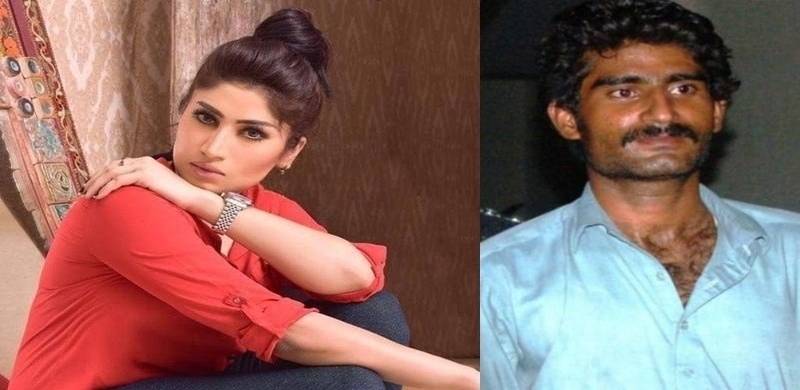
A model court in Multan on Friday sentenced Qandeel Baloch's brother Mohammad Waseem, the prime suspect in the social media star's murder case, to life imprisonment, but acquitted all other accused. Those acquitted include Mufti Abdul Qavi, her other brother Aslam Shaheen, Haq Nawaz, Abdul Basit and Mohammad Zafar Hussain.
While life sentence to Muhammad Waseem is a welcome development, the acquittal of Mufti Qavi and other suspects raises several questions. Most cases of ‘honour’ killing in Pakistan do not reach their logical conclusion and the suspects are let go due several lacunas in the laws which the criminals are able to use in their favour.
But because of its high-profile status, the Qandeel murder case did not end in an all-too-familiar ‘compromise’ where the victim’s family pardons the perpetrators ‘in the name of God’.
Last month, Qandeel Baloch’s parents had submitted an affidavit in the court saying they have pardoned their sons for the murder and urged the court to acquit them. But the appeal was thankfully turned down by the court.
However, even in such a high profile case, the court once again failed to set a precedent against killing in the name of ‘honour’. And justice was only half-served. This partial justice was also made possible by the efforts of rights activists and lawyers who made sure the case stays in the spotlight.
Had it not been for the attention the case received due to Qandeel’s celebrity status, the closure would have been much more disappointing. Because Pakistan’s criminal justice system has a track record of failing women victims of violence.
The acquittal of Mufti Qavi is particularly concerning, because his involvement in the events that led to Qandeel’s murder is public knowledge. Qandeel’s convicted brother had also mentioned Qavi in his statement to police following the incident.
In cases of ‘honour’ killing, which are motivated by the misplaced notion of ‘honour’, all those involved in orchestrating the violent acts ought to be brought to justice. But those who orchestrated Qandeel’s murder were conveniently acquitted.
Mufti Qavi’s acquittal is yet another reminder of the fact that religious quarters in Pakistan are untouchable.
“Qandeel’s killing should be a lesson that no one should mock the ulema”, Mufti Qavi had said, reacting to Qandeel’s murder in 2016. A few days before her murder, Qandeel had stated that she was receiving death threats from Mufti Qavi. Yet he faced no consequences and will continue to walk free. The verdict, therefore, failed to serve justice in its entirety.
While life sentence to Muhammad Waseem is a welcome development, the acquittal of Mufti Qavi and other suspects raises several questions. Most cases of ‘honour’ killing in Pakistan do not reach their logical conclusion and the suspects are let go due several lacunas in the laws which the criminals are able to use in their favour.
But because of its high-profile status, the Qandeel murder case did not end in an all-too-familiar ‘compromise’ where the victim’s family pardons the perpetrators ‘in the name of God’.
Last month, Qandeel Baloch’s parents had submitted an affidavit in the court saying they have pardoned their sons for the murder and urged the court to acquit them. But the appeal was thankfully turned down by the court.
However, even in such a high profile case, the court once again failed to set a precedent against killing in the name of ‘honour’. And justice was only half-served. This partial justice was also made possible by the efforts of rights activists and lawyers who made sure the case stays in the spotlight.
Had it not been for the attention the case received due to Qandeel’s celebrity status, the closure would have been much more disappointing. Because Pakistan’s criminal justice system has a track record of failing women victims of violence.
The acquittal of Mufti Qavi is particularly concerning, because his involvement in the events that led to Qandeel’s murder is public knowledge. Qandeel’s convicted brother had also mentioned Qavi in his statement to police following the incident.
In cases of ‘honour’ killing, which are motivated by the misplaced notion of ‘honour’, all those involved in orchestrating the violent acts ought to be brought to justice. But those who orchestrated Qandeel’s murder were conveniently acquitted.
Mufti Qavi’s acquittal is yet another reminder of the fact that religious quarters in Pakistan are untouchable.
“Qandeel’s killing should be a lesson that no one should mock the ulema”, Mufti Qavi had said, reacting to Qandeel’s murder in 2016. A few days before her murder, Qandeel had stated that she was receiving death threats from Mufti Qavi. Yet he faced no consequences and will continue to walk free. The verdict, therefore, failed to serve justice in its entirety.
